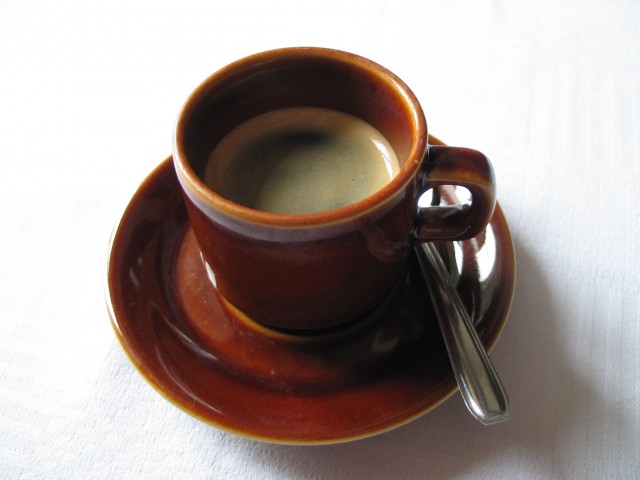
It's now possible to calculate how badly you'll spill your coffee, based on cup shape and walking mechanics.
Wikimedia Commons
With Sweden gearing up to hand out this year's Nobel Prizes, that means it's time for Nobel's more recent cousin, the Ig Nobel, to grab the spotlight and point it at Boston. The Igs, which honor "achievements that first make people laugh, then make them think," are handed out at an elaborate ceremony that involves a mini-opera, lots of paper airplanes, and a handful of Nobel Laureates, who hand out the Ig Nobels to the latest winners.
Unlike the Nobels, which are severely constrained in the awards they can hand out (oh, it's in physics, again) the people behind the Igs have the luxury of being able to make up categories in order to award anything that happens to appeal to them. This year, for example, featured winners in acoustics, fluid dynamics, and anatomy. Without further ado, the winners:
- Chemistry: Solving the mystery of green hair. This went to Sweden's Johan Petterson (who attended the ceremony), an environmental engineer who worked for a local council that included a village where the local blonds were having their hair turn green. Petterson identified the culprit as copper piping, and suggested a cure: either shorter or colder showers.
- Acoustics: Jamming speech. Both members of this Japanese team, who have developed the SpeechJammer, received their award for a device that plays someone's words back to them after a slight delay, which is enough to throw someone off mentally and get them to stop talking. Possible applications suggested by the developers: a device that will force people in a meeting to speak in turns, and a "Portable speech-jamming gun."
- Fluid Dynamics: Walking with coffee. Another 2012 paper, this one with practical applications. "In our busy lives, almost all of us have to walk with a cup of coffee," the text, in Physical Review E begins. "While often we spill the drink, this familiar phenomenon has never been explored systematically." As it turns out, both the specifics of the cup and the biomechanics of walking play a role in making the mess. One of the two authors was there to pick up the prize.
- Medicine: Exploding colons. "Colonic gas explosion, although rare, is one of the most frightening iatrogenic complications during colonoscopy." Frightening would not seem to even begin to describe it (incidentally, "iatrogenic" means a complication produced by a medical procedure). Apparently, the combination of a buildup of digestive gasses and electric cauterization is not good for the patient. With a good colonic cleansing, however, it should all be safe.
- Anatomy: Your backside looks familiar. Noted primatologist Frans de Waal took home an Ig Nobel for this paper, which involved showing chimps the rear ends of their compatriots and unfamiliar chimps. Chimps were successful at identifying the rears of those they were familiar with.
- Psychology: Leaning to the tall side. This one gets bonus points for a key piece of experimental equipment: the Wii balance board. Subjects were stood on the board and asked questions as it imperceptibly leaned them either left or right. The direction of lean apparently altered the answers, leading to the paper's title: "Leaning to the Left Makes the Eiffel Tower Seem Smaller."
- Neuroscience: The active brain of a dead salmon. This study comes from a journal that sounds like the natural home of Ig Nobel level results: the Journal of Serendipitous and Unexpected Results. But the study, while tongue-in-cheek, has a serious message. Functional MRI machines now have enough resolution that they divide the brain into hundreds of thousands of units, and the large numbers increase the number of false positives that result. "To highlight the danger of this practice," the authors write, "we completed an fMRI scanning session with a post-mortem Atlantic Salmon as the subject."
- Peace: Diamonds in the ammo. If Russia's SKN Company had an Internet presence before the awards, it has been completely wiped from the first few pages of Google search results by their new honor. The company, represented by Igor Petrov, took home the prize for figuring out how to extract diamonds from old Soviet ammo.
- Literature: Infinite report regression. It's not often that the government gets honored for the quality of its prose, but an analysis from the GAO took home the prize for being "a report about reports about reports that recommends the preparation of a report about the report about reports about reports." No surprise that it was occasioned by a policy adopted by the Department of Defense.
As always, the night featured the famous 24/7 lectures, in which experts attempt to describe their research in 24 seconds, then provide a seven word summary appropriate for a general audience. This year's speakers tackled the Universe, arsenic-based life, mass spectrometry, and (from the sound of it) tasering someone.
Read 1 remaining paragraphs | Comments
DIGITAL JUICE
No comments:
Post a Comment
Thank's!